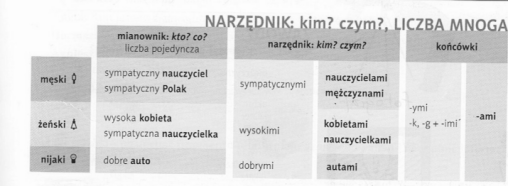Hi everyone
Can anyone shed any light on a difficulty I have with narzędnik liczba mnoga.
I have 'Hurra!! Po Polsku 1' and slowly working through the workbook (zeszyt ćwiczeń). Come to check my answers but I'm confused why the answers are as they are!
We are given a statement and have to choose the correct endings. Na przykład:
1. Eva jest Niemką i Melanie jest miemką. One są Niemkami.
2. Marek jest Polakiem i Anna jest Polką. Oni są Polakami.
3. Anna i Agnieszka są sympatycznymi Polkami (sympatyczna Polka).
4. Oni są kreatywnymi studentami (kreatywny student).
5. One są ambitynymi studentakmi (ambitna studentka).
6. Interesujesz się Japonskimi autami (Japonskie auto).
7. Oni są dobrymi nauczyciekami (dobry nauczyciel).
8. Magdalena i Dorota są dobrymi naucycielkami (dobra nauczycielka).
9. Mariusz i Pawel są wysokimi mezczyzna (wysoki mezczyzna).
10. Wanda i Basia są ładnymi i sympatycznymi kobietami (ładna i sympatyczna kobieta)
11.czy jesteście ambitnymi studentami (ambitny student).
12.Interesujemy się aktualnymi informacja (aktualna informacja).
I've copied the table I am referring to at the bottom on this post.. am I stupid? Can anyone shed any light on what I'm missing. Many thanks,
TABLE ATTACHED!
Dziekuje!
Can anyone shed any light on a difficulty I have with narzędnik liczba mnoga.
I have 'Hurra!! Po Polsku 1' and slowly working through the workbook (zeszyt ćwiczeń). Come to check my answers but I'm confused why the answers are as they are!
We are given a statement and have to choose the correct endings. Na przykład:
1. Eva jest Niemką i Melanie jest miemką. One są Niemkami.
2. Marek jest Polakiem i Anna jest Polką. Oni są Polakami.
3. Anna i Agnieszka są sympatycznymi Polkami (sympatyczna Polka).
4. Oni są kreatywnymi studentami (kreatywny student).
5. One są ambitynymi studentakmi (ambitna studentka).
6. Interesujesz się Japonskimi autami (Japonskie auto).
7. Oni są dobrymi nauczyciekami (dobry nauczyciel).
8. Magdalena i Dorota są dobrymi naucycielkami (dobra nauczycielka).
9. Mariusz i Pawel są wysokimi mezczyzna (wysoki mezczyzna).
10. Wanda i Basia są ładnymi i sympatycznymi kobietami (ładna i sympatyczna kobieta)
11.czy jesteście ambitnymi studentami (ambitny student).
12.Interesujemy się aktualnymi informacja (aktualna informacja).
I've copied the table I am referring to at the bottom on this post.. am I stupid? Can anyone shed any light on what I'm missing. Many thanks,
TABLE ATTACHED!
Dziekuje!

instrumental.gif
 PolishForums LIVE / Archives [3]
PolishForums LIVE / Archives [3]